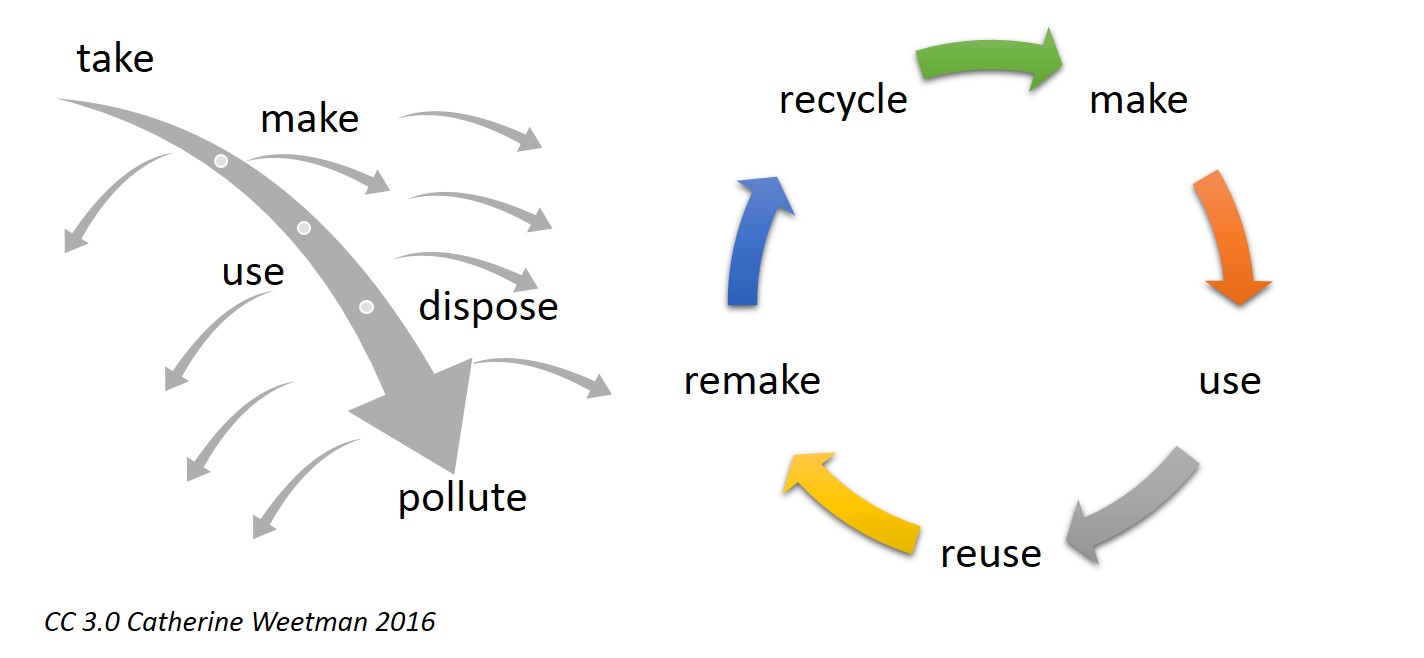Five critiques of the circular economy
and my own attempt to answer some of them.

Linear vs Circular Economy (source: Wikipedia)
</em></u>
Yesterday the Culture and Organization Journal put online the introduction to its special issue on the contested realities of the Circular Economy (CE). Nine statements in that introduction got my attention. As far as I understand, their common thread is that…
“Standard” Circular Economy is untested, and not radical enough anyway
1: “Despite the nearly revolutionary rhetoric of its advocates, the CE, in its hegemonic variety, is a child of the less than radical neo-classic economic theory and ecological modernization paradigm”.
2: CE thinking “amounts to incremental rather than radical transformations, a “weak” rather than a “strong” form of sustainability”.
3: “CE and circular business model tend to overlook the social dimension of sustainability”
4: “Turning the CE into a pathway for a transition to sustainability would require aligning it with the degrowth agenda, which is quite the contrary to how the European Commission (2018) frames it as a mechanism for economic growth.”
5: “Is a CE more inclusive and just than a linear one?”
My own remarks about Circular Economy
Looking at those critiques and questions, I would say that:
1 and 2: maybe “standard” Circular Economy really is just incremental, and “less than radical”. But whenever I encounter critiques like this, the first thing that comes to my mind is Doc Searls saying, fifteen years ago, “perhaps the moderate position is the most radical of all. That is, if you want to get something done that works for everybody."
3: true. Period. Not always though. As an example, see Comunificadora, a project managed by my Catalan partners of the Free Knowledge Institute.
4: THIS is the real problem: the EU is still too much a traditional economy project, that still frames and redefines too many issues only (or primarily) in terms of GDP growth. For the record, I too wrote about this “meta-issue” years ago, in the conclusions of a report about Digital DIY support and awareness in Europe.
5: “Is a CE more inclusive and just than a linear one?” Not necessarily. As in any other human effort, even if you chose the right tool, you must want to make it work in the right way.
Who writes this, why, and how to help
I am Marco Fioretti, tech writer and aspiring polymath doing human-digital research and popularization.
I do it because YOUR civil rights and the quality of YOUR life depend every year more on how software is used AROUND you.
To this end, I have already shared more than a million words on this blog, without any paywall or user tracking, and am sharing the next million through a newsletter, also without any paywall.
The more direct support I get, the more I can continue to inform for free parents, teachers, decision makers, and everybody else who should know more stuff like this. You can support me with paid subscriptions to my newsletter, donations via PayPal (mfioretti@nexaima.net) or LiberaPay, or in any of the other ways listed here.THANKS for your support!